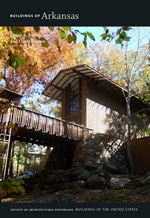El Dorado was founded, platted, and designated the county seat in 1843, and a courthouse and hotel were built shortly after. Agriculture, particularly cotton, was the mainstay of the region’s economy. The arrival of the railroad in 1891 opened up markets to St. Louis and New Orleans and allowed the lumber industry to flourish. But El Dorado really boomed in the 1920s after oil was discovered just west of town in 1921, and by the end of that year 275 wells had been drilled in the vicinity, making the city the oil capital of Arkansas. El Dorado’s population of 3,000 in 1921 jumped to 15,000 in 1923 and to 30,000 in 1925; it began to decline after that and is now around 18,500. The population explosion and the accompanying prosperity resulted in a city rich in commercial and residential buildings dating from the late 1920s and into the 1940s when war-related industries sustained the boom. Such major oil refineries as Lion Oil and Murphy Oil established headquarters here, and the town’s economic base has broadened to include chemical plants and poultry production. Although the oil industry declined in the 1960s, it continues to be central to the economy, and Murphy Oil has constructed a new headquarters (2015, Polk Stanley Wilcox Architects) at 300 E. Peach Street. It is a glistening modern two-story building linked by a glass stairway to a five-story office tower. Today, El Dorado has a mixed economy, is a regional commercial and entertainment center, and has actively promoted cultural tourism related to its oil heritage.
Writing Credits
If SAH Archipedia has been useful to you, please consider supporting it.
SAH Archipedia tells the story of the United States through its buildings, landscapes, and cities. This freely available resource empowers the public with authoritative knowledge that deepens their understanding and appreciation of the built environment. But the Society of Architectural Historians, which created SAH Archipedia with University of Virginia Press, needs your support to maintain the high-caliber research, writing, photography, cartography, editing, design, and programming that make SAH Archipedia a trusted online resource available to all who value the history of place, heritage tourism, and learning.

